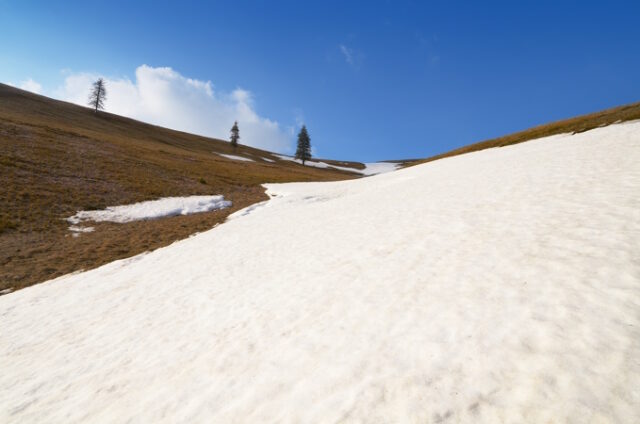
Dear EarthTalk: What are ski resorts doing to fight back against global warming and keep their businesses alive as the world warms? Which ski resorts or ski regions will fare best in the future? — C. Warner, Aspen, CO
As the world warms, many of our customs begin to feel the encroaching threat of climate change. Skiing is one dramatic example, among many. With warming winters and increasingly unpredictable snow, the ski industry, like the white winters it relies upon, is slowly being nudged towards extinction.
But necessity is the mother of invention, and the increased threat the ski industry faces is also what has encouraged it to take great leaps toward a sustainable future. Says Gilles Delarule, head of tourism for Courchevel, one of France’s most famous ski resorts, “It’s a responsibility that everyone needs to have for the next generation. If we don’t protect nature, we won’t have skiing for the future.” Needless to say, perhaps, finding sustainable ways to generate electricity is necessary for affording the increased burden of snowmaking, and for slowing or reversing the climate change that is why more snowmaking is needed.
This same mantra of ‘diversify or die’ has been carried across the Atlantic, too. Aspen Skiing Company, for instance, is already on track to shift to 100 percent renewable energy by 2030 and has invested $5.24 million in a plant that converts methane from coal into electricity. Jackson Hole Mountain Resort in Wyoming is already entirely powered by an Idaho wind farm, and Big Sky Resort in Montana has been fueled by renewable energy since 2021. The nimbleness of the ski industry in reacting to the climate crisis is an example of what can happen when companies have a vested interest in going green.
As for the ski resorts and regions that are most likely to survive longest as we move into a warmer future, the answer is not so optimistic. “Are we winning? No,” says Auden Schendler, the Senior Vice President of Aspen Skiing Company. “You’ve got to reverse global CO2 emissions and bend the curve down and that’s not happening.” Despite their efforts, the ski industry cannot halt the climate crisis alone. Until the rest of the world begins to take the vital action needed, the ski resorts that stand the best chance of survival are not those most proactive in fighting warming, but rather those fortuitously situated closest to the poles, with the highest latitude and the lowest temperatures.
The Institute for Snow and Avalanche Research (ISAR) predicts that if we continue with a “business-as-usual” level of emissions—without changing our consumption of gas, oil and coal—then the Alps risk losing up to 70 percent of their snow coverage by 2100. The stakes are high for change, however. “The world is currently on track for an average of 2.7C (4.9F) of warming by 2100,” reports ISAR. “If global temperature rise is kept below 2C (3.6F), though, the reduction in snow cover will be limited to 30 percent.”
Although the future for skiing is not all that bright, a glimmer of hope can be found among the many resorts that demonstrate what action is possible in the face of the climate crisis. If other industries followed suit, then perhaps skiing, like our white winters, would stand a chance of surviving extinction.
CONTACTS: The 10 Ski Resorts Most Threatened By Climate Change, leafscore.com/eco-friendly-fitness-products/ski-resorts-most-threatened-by-climate-change/; Save Our Snow, saveoursnow.com/












